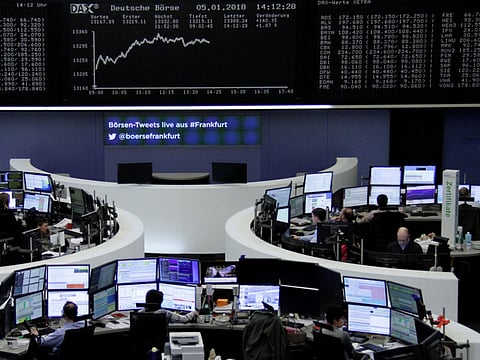Stocks scale new record highs, dollar stuck
Pan-European STOXX 600 index was up 0.4 per cent, holding at a two-month high

London: World stocks scaled fresh record highs on Friday, while the dollar stuck near four-month lows before crucial payroll numbers that could underpin growing confidence in the world’s biggest economy.
Global equity markets have begun 2018 with their best week in more than a year, continuing last year’s rally that has seen volatility plunge and investors’ appetite for risk surge.
Data on Friday showing Eurozone inflation slowing in December will also help bulls stay convinced central banks are not going to tighten monetary policy faster than expected.
MSCI’s gauge of stocks across the globe was up 0.19 per cent, above 524 points and at a record high.
The Swiss benchmark rose to an all-time high, and the British index moved to another record, supported by optimism over regional economic strength and gains in US stocks overnight.
The pan-European STOXX 600 index was up 0.4 per cent, holding at a two-month high. The first trading week of 2018 looks set to be the best for Eurozone stocks since May, as shares shrug off a stronger single currency.
“There is little impediment for continued gains whilst economic conditions that we’ve seen over the last few months continue, and there’s every reason to expect that to continue to be the case,” Ken Odeluga, market analyst at City Index, said.
Emerging market stocks have had their best start to the year since 2006 and added to those gains on Friday.
Upside for euro
The US dollar failed to draw much strength from better-than-expected private payrolls data on Thursday and manufacturing numbers earlier this week, leaving the greenback around a four-month low against the euro.
Eurozone prices grew by 1.4 per cent in December on a year earlier, a slower rate than in the previous month. That provides support for the European Central Bank’s decision to keep policy easy despite growing pressure from richer Eurozone countries.
Still, with two US interest rate hikes already baked into market expectations, traders believe there is more upside room for the euro as the ECB may move to rein in its monetary largesse faster than the market anticipates.
“Currency markets broadly know what the Fed is going to do this year but the ECB monetary policy may be the surprise package of 2018,” said Richard Falkenhall, senior FX strategist at SEB in Stockholm.
The dollar has weakened as US long-term bond yields have remained low, despite the Federal Reserve increasing interest rates three times last year.
The 10-year US Treasuries yield stood just above 2.46 per cent, below its seven-month peak of 2.504 per cent touched on Dec. 21.
Those levels are little different from about a year ago, even with market expectations for another three hikes in 2018.
Expectations that inflation will remain low as wage growth has been slower than before the 2007-2008 financial crisis has capped US long-term bond yields.
Gold on track for gain
Elsewhere, oil prices slipped from highs last seen in 2015 after soaring US production undermined a 10-percent rally driven by tightening supplies and political tensions in Iran — from lows hit in December.
Gold prices dipped from the previous session’s 3-1/2 month high but remained on track for their fourth straight weekly gain.
Signs of investor appetite for risk more broadly were evident in Greece, where 10-year borrowing costs hit their lowest in 12 years on Friday.
The country, once on the verge of defaulting on its debts, has benefited from expectations of a clean exit from its bailout this year and a revival in the economy.
“Greece’s fundamentals have been on the mend and investors have been looking at the yield pickup they get from investing in that debt,” said DZ Bank strategist Christian Lenk.
“Also, a rising tide lifts all boats — with the Eurozone economy doing so well, it’s a very ‘risk on’ environment and that is benefiting Greece.” For Reuters Live Markets blog on European and UK stock markets open a news window on Reuters Eikon by pressing F9 and type in ‘Live Markets’ in the search bar.


